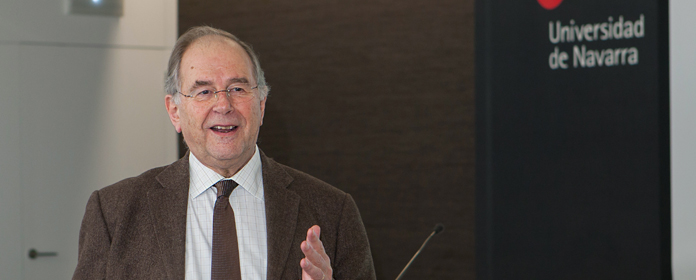"Geopolitical decisions weigh heavily when investing in development projects"
Olivier Lafourcade, former director of the World Bank for Colombia, Mexico and Venezuela, gave a conference organized by NCID

"Does it make sense for a country to invest in another nation’s institutions when that nation’s government has a different political agenda? Geopolitical decisions weigh heavily when investing in development projects," or so argued Olivier Lafourcade, a former director for the World Bank, at the Navarra Center for International Development (NCID) of the University of Navarra.
He recalled the change in the European Union's development agenda when the European Commissioner for Cooperation and Development was a Spanish citizen. He also highlighted the "geopolitical limits and constraints" of the traditional system, which corresponds to a conglomerate made up of large investments from traditional private sector players, such as Rockefeller, from new fortunes like Bill Gates, international NGOs such as Caritas, migratory remittances, business and from recent sovereign investment funds.
Lafourcade highlighted how, unlike international agencies such as the World Bank or the UN, private funding sources follow their own criteria, noting that donors such as Bill Gates can make "completely temperamental" contributions, in contrast to public institutions where "all decisions are made systematically and collectively."
Effectively managing resources for innovationWith regard to the topic of his presentation at NCID, Olivier Lafourcade stressed that, "To be innovative in financing development, you have to make optimal use of resources." In that regard, he emphasized the importance of "making sure traditional actors are efficient" and managing development investment like multilateral and bilateral institutions, European bodies, specialized and private funds, and NGOs.
"Funds are mainly generated from direct taxes and those applied to consumption," Lafourcade mentioned and also recalled that, "Only 10% of aid comes from loans from multilateral agencies." Faced with this situation, the three-time director of the World Bank in Colombia, Mexico and Venezuela recalled that it is necessary to "mobilize money" from SMEs, successful entrepreneurs and international organizations to contribute to development.
For his part, he lamented that UN member countries do not actually contribute 0.7% of their GDP to development aid, as established at the 2002 International Conference on Financing for Development in Monterrey.
In addition to the criterion of how much money to invest, he raised the "vital" issue of development investors: "What criteria should I follow to know where I should put my money?" The answer, in his words, is "to study the efficiency of each actor." In addition to analyzing each entity’s management of resources before investing, he recalled that it is necessary to take into account the limits that constrain governmental entities.
The expert gave these remarks during a conference on financing development and alternatives to traditional funding channels. It was organized by the Navarra Center for International Development (NCID) of the Institute for Culture and Society at the University of Navarra. He also offered a session to the Economics, Leadership & Governance Program within Navarra’s School of Economics and Business Administration.
